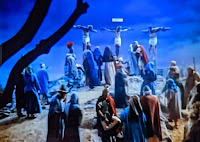In 1921 Greece, we see Father Fotis lead a group of villagers as they leave their small town, after it is destroyed by marauding Turkish troops, to find a new place to live. In another village a few miles away, the townspeople live in peace with the occupying Turks led by the Agha, a somewhat intimidating but not unfriendly man who enjoys good food for consumption and young boys as companions. Patriarcheas, the town's mayor and chief landowner, has talked the Agha into letting the town put on the Passion Play that they do every seven years—this would be the first play since the end of WWI. Father Grigoris calls a town meeting at the church to assign roles in the play. Katerina (Melina Mercouri) is a young widow who makes ends meet as a prostitute (and also gives massages to the Agha). The townswomen don't take well to her, but Grigoris insists on giving her the role of Mary Magdalene. Michelis, the handsome son of the mayor, and Yannakos, the nosy postman, are assigned the roles of apostles. The beefy butcher Panagiotaros, a frequent customer of Katerina's, is Judas. Finally, Manolios, the handsome blond shepherd (Pierre Vaneck) is cast as Jesus, a somewhat inexplicable choice as the shepherd is illiterate and can barely get through a sentence without stammering. Just after the roles are assigned, the refugees from the burnt-out village arrive seeking food and shelter. The townspeople at first are sympathetic, but the mayor seizes on the death of a pale woman to claim that the refugees are carrying cholera (though she actually died of starvation) and to send them away. Fotis leads the ragged group of villagers up into the dry and dusty hills overlooking the town where they make a primitive camp but are still barely staying alive.
When Yannakos is told that he can make some money by taking them food and supplies in exchange for their jewelry and wedding rings, he does, only to feel compassion for them, and he decides to give them the food for free. Similarly, Katerina leads a sheep up in the hills so the people can have milk. The other apostle players wind up helping the refugees, but when Manolios reports to the mayor and Father Grigoris that the people do not have cholera, they order him not to tell the other townspeople—the priest tells Manolios that he has the "cholera of heresy, the cholera of rebellion." It's made clear that the mayor and the priest fear anarchy if they accept the refugees. We can see where this is going: the Passion Play actors are acting in a truly Christian manner that goes against the hypocrisy of the town leaders (and the Judas character, jealous of the attention that Katarina pays to Manolios, will soon embody his role more concretely). Will Biblical history repeat itself?
I'd never heard of this French-language film but I'm certainly glad I ran across it when doing an IMDb search on the actor Maurice Ronet (who plays Michelis). This 60-some year old movie, with its themes of Christian hypocrisy (today's evangelicals) and brutal treatment of refugees (today's Republicans), is sadly still relevant. The director Jules Dassin created a unique Easter treat for classic film fans (though the seriousness of the film may make the word 'treat' not quite right). Filmed in the village of Kritsa on Crete with actual townspeople as both groups of villagers, this is not only thought-provoking but also entertaining, with very good performances from everyone, especially Vaneck as the Christ figure, Gert Frobe (Goldfinger) as the mayor, and Ronet as Michelis. The symbolism can be a bit heavy at times, making the narrative predictable (although the ending manages the trick of being a bit unpredictable as well as both ambiguous and satisfying) but watching all the parts and people slipping into place kept me fully engaged. Mercouri is good but a bit too intense at times; her eyes make her look alternately aroused or angry, sometimes both. Other actors of note include Jean Servais as Father Fotis and Carl Mohner as an assistant to the Agha. The IMDb summary says the plot concerns Greek villagers rebelling against their Turkish occupiers, but this doesn't happen until the last few minutes, and then only because the Agha, who has tried to remain neutral, is forced into backing Father Grigoris. The ultimate message is delivered by Michelis who says if Christ returned, he would be crucified again, and the priests would be driving in the nails. (The film is based on the Nikos Kazantzakis novel Christ Recrucified.) I'm so glad I saw this in time for Holy Week viewing this year. I can see this becoming part of my Easter film-watching canon. As far as the commentary, like most on Kino Lorber discs, it's awful; don't bother. I listened to one hour of it and the commentator spends all his time talking about the director and his friends, and says next to nothing about the movie we're watching. Pictured at top are Ronet, Mercouri, and Vaneck; at right is Roger Hanin as the Judas figure. [Blu-ray]











